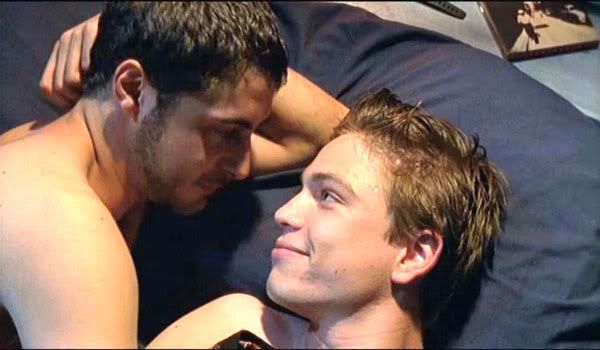Sunday, April 24, 2011
 9:27 PM |
A Quiet World of Useless Pain
9:27 PM |
A Quiet World of Useless Pain

There is a scene in Christian Faure's powerful and surprisingly deft
Juste une Question d'Amour [
Just a Question of Love, 2000] where a mother tells the lover of her gay son: "You're much too young to carry around all that useless pain." The boy has just been accidentally outed, and has subsequently been told by his very conservative family that he could not go home again.
Despondent, he finds everything else that matters in his life on the verge of collapse. There is only a world -- a vastness of it -- of pain. But Emma (the mother played by the brilliant Eva Darlan) gives that admonition without a tone of dismissiveness. She is not being patronizing either, but says it with that certain kind of knowing (the way the wisest people
know) that we all carry in life a lot of "useless" pain; this is sometimes a cross we feel the necessity to carry, most often in consideration for the people we love. How does one not hurt the people we love? Sometimes we lie or we pretend to be someone else to do exactly that -- a well-intentioned, if totally misguided, endeavor. Yet, almost always, the eventual uncovering of this lies ironically ends up hurting more the very same people we vowed never to hurt. I'm not sure if I make sense here. But this is the "uselessness" of the thing: we don't have to bear the cross; bearing the cross never really helps in the long run; and yet, and yet...
This film is the story of an emotionally volatile young man named Laurent (the incandescent Cyrille Thouvenin), an agronomist in training. He's been flailing in school, roughly around the same time his cousin Marc died of hepatitis, after Marc had been thrown out by his parents on the event of his coming out as a gay man. Laurent is shocked and angry by the capacity of his family to do something so cruel -- and knowing that he is himself homosexual, he starts keeping secrets. He starts playing the "hetero game" for his parents, using his best friend and roommate Carole (the beautiful Caroline Veyt) as a kind of mustache.
(Don't we know a lot of people exactly like this...) Carole genuinely loves him, but has long since given up on the idea of being with him. Later on, she gives him the ultimatum: that Laurent can't continually use other people just because he can't summon the courage to be exactly who he is. And then Laurent gets assigned by the school to train under Cédric (the wonderful Stéphan Guérin-Tillié), an older botanist of quiet ways and strong convictions.
They fall in love.
And now the drama begins. How does Cédric exactly convince Laurent that staying in the closet is never the answer to things? He tells Laurent, "I'm over with feeling shame now. I'm not ashamed to be with you." It is not that easy for Laurent. Hw does a son who loves his family risk losing them simply because they cannot conceive of the very idea of a gay son? Later on, Emma tells Cédric, her own son, that it is perhaps unfair of him to expect Laurent to run with the same velocity as he him. So you see how this goes: a whole lot of "useless" pain -- just a question of love among everyone involved, but love thwarted by the very idea of not wanting to hurt.
The emotional complexities laid bare in this film are treated with a genuine desire to engage, and it is to the credit of the filmmakers that a film such as this does not fall under the easy sentimentality of a Hallmark TV movie. It is a deftly-handled film that not only takes in the consciousness of our gay protagonists, but also takes into account the weight of everyone else's pain -- the roommate and best friend, the mothers, and the fathers. It also tells, with unwavering commitment, their story, their struggles to accept something that brings them a measure of pain. And that perhaps makes this a superb achievement: the film offers no caricatures or easy solutions, it brings up all the nuances of complicated personal stories such as this, it banishes away easy sentimentality, and it creates totally human characters who are all capable of so much depths. Near the end of the film, a simple declaration of "Je t'aime, je t'aime" has never sounded so emphatic, so real.
Truth to tell, I still cannot believe this is actually a TV movie.
A TV movie in France! It has all the epic elegance and emotional weight and the beautiful frankness of a regular French feature film.
Labels: film, queer
[0] This is Where You Bite the Sandwich
GO TO OLDER POSTS
GO TO NEWER POSTS

















 9:27 PM |
A Quiet World of Useless Pain
9:27 PM |
A Quiet World of Useless Pain
